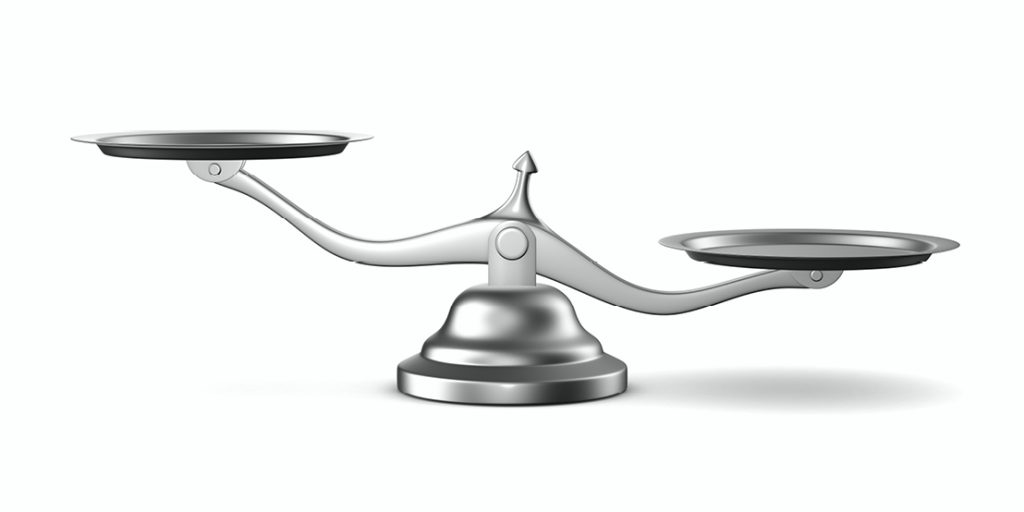Balancing Leadership

The central dilemma of a modern leader is to balance apparently conflicting virtues and beliefs without choosing sides between them.
Decisiveness is widely and rightly perceived as crucial to effective leadership. It’s the opposite of uncertainty and insecurity, which are paralyzing. But decisiveness overused eventually congeals into certainty. The balancing opposite is openness.
The program 60 Minutes ran a segment on a Louisiana prosecutor named Marty Stroud. In his very first death row case, Mr. Stroud overlooked conflicting evidence and won the murder conviction of a black man named Glenn Ford with an all-white jury. For the next 30 years, Mr. Ford was kept in solitary confinement at the notorious Angola prison in southern Louisiana.
In 2014, the real murderer confessed and Mr. Ford’s conviction was overturned. Reflecting back on his zeal to convict, Mr. Stroud was deeply repentant.
“I was arrogant, narcissistic, and caught up in the culture of winning,” he told 60 Minutes.
A prosecutor requires decisiveness to do his job well. What Mr. Stroud apparently lacked was an equal degree of open-mindedness, until it was much too late. The capacity to own his failure may now be a saving grace in Mr. Stroud’s life, but it cost Mr. Ford his. He died of cancer four months after his release from prison.
Consider, for a moment, these seemingly paradoxical qualities:
RESULTS-FOCUSED – REFLECTIVENESS
HONESTY – COMPASSION
TOUGH-MINDEDNESS – GENTLENESS
CONFIDENCE – HUMILITY
RATIONALITY – INTUITION
INTELLIGENCE – CURIOSITY
PASSION – COMPOSURE
PRACTICALITY – VISION
Is there any doubt that for each set of pairs above, most of us tend to favor one more than the other? Or that as a culture — especially in business and especially for those in leadership roles — we value the constellation of virtues on the left far more than we do those on the right?
We crave certainty because it makes us feel more safe. But in an increasingly complex and pluralistic world, there aren’t any simple solutions. Great leaders are defined today not by having the right answers but by the willingness to embrace and grapple with conflicting and sometimes paradoxical “truths.”
Nearly all of us perceive honesty as a virtue. It gives us a solid ground to stand on, and therefore makes us more trusting and secure. Or does it? Honesty overused — treated as a singular virtue by itself — can actually lead to cruelty.
A leader may deliver harsh feedback, in a spirit of honesty, to get an employee to change a behavior. However, that often leads to just the opposite. The recipient feels attacked and responds with defensiveness and resentment, too threatened to take in the feedback, even if it is accurate. Communicating feedback effectively requires holding each of these seemingly opposite poles — honesty and compassion — and continuously moving between them as circumstances demand.
By contrast, I consulted not long ago for a financial services company whose leaders prided themselves on an unusually collegial culture — rare for that industry. Employees treated one another with respect, care, and great civility. The problem was that all decisions were made by consensus and no one felt comfortable delivering critical feedback to anyone. Decision- making was torturous, and younger employees felt insecure in the absence of honest feedback.
A great leader continually challenges her people to push beyond their current comfort zones. But pushing people too relentlessly eventually prompts fear and fatigue, both of which undermine great performance. In this case, the balancing opposite is nurturing and caring for those one leads.
“There is always an optimal value,” said the anthropologist Gregory Bateson, “beyond which anything is toxic, no matter what: oxygen, sleep, psychotherapy, philosophy.” The ultimate win is a win-win.
Greatness as a leader, and beyond that as a human being, requires the vision to see more and exclude less. It means looking inside ourselves more deeply, as well as outside ourselves, beyond self-interest and immediate gratification. It means not just resisting the deep impulse to choose up sides to avoid uncertainty, but also challenging our blind spots and wrestling with our infinite capacity for self-deception.
“There is no decision that we can make that doesn’t come with some sort of balance or sacrifice.”
SIMON SINEK